KIA RIO HATCHBACK 2013 Repair Manual
Manufacturer: KIA, Model Year: 2013, Model line: RIO HATCHBACK, Model: KIA RIO HATCHBACK 2013Pages: 385, PDF Size: 9.68 MB
Page 61 of 385
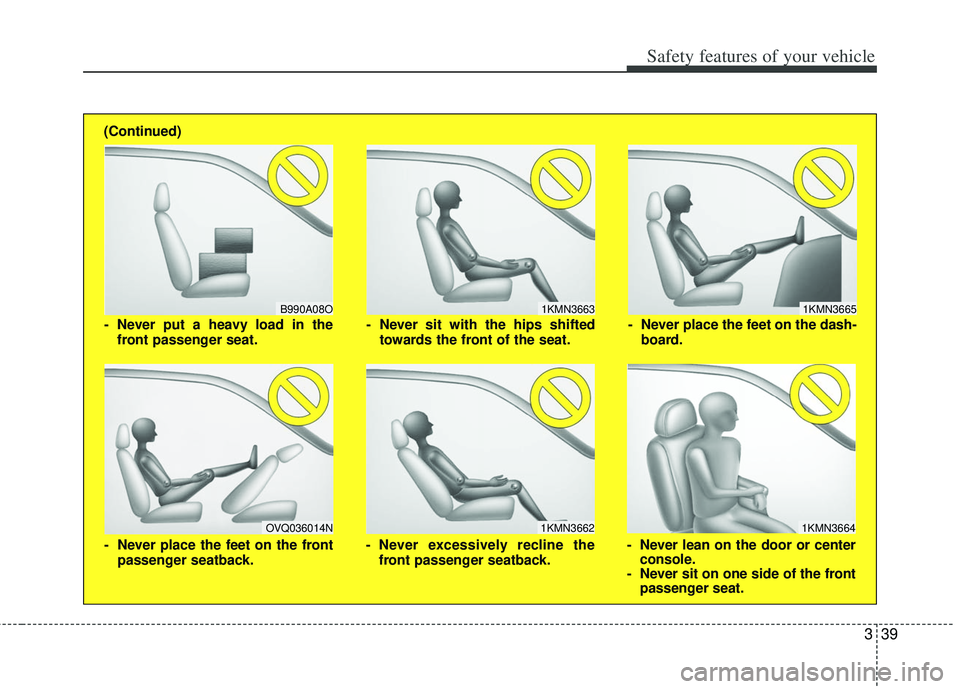
339
Safety features of your vehicle
1KMN3663
1KMN3664
1KMN3665
- Never sit with the hips shiftedtowards the front of the seat.
- Never lean on the door or centerconsole.
- Never sit on one side of the front passenger seat.
- Never place the feet on the dash-
board.
B990A08O
1KMN3662
- Never put a heavy load in thefront passenger seat.
- Never excessively recline thefront passenger seatback.
OVQ036014N
- Never place the feet on the frontpassenger seatback.
(Continued)
Page 62 of 385
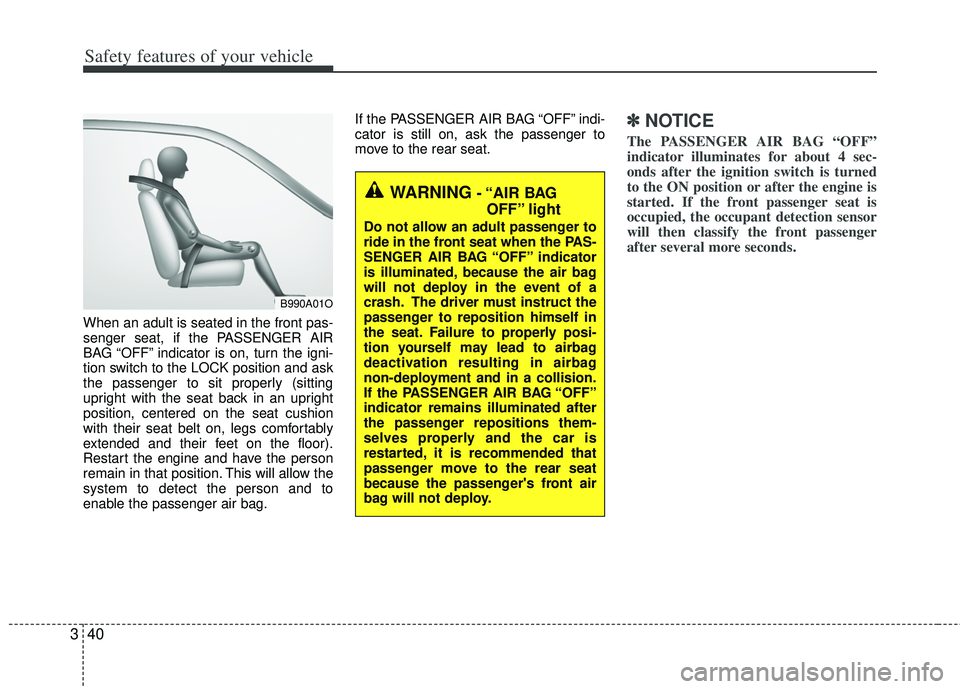
Safety features of your vehicle
40
3
When an adult is seated in the front pas-
senger seat, if the PASSENGER AIR
BAG “OFF” indicator is on, turn the igni-
tion switch to the LOCK position and ask
the passenger to sit properly (sitting
upright with the seat back in an upright
position, centered on the seat cushion
with their seat belt on, legs comfortably
extended and their feet on the floor).
Restart the engine and have the person
remain in that position. This will allow the
system to detect the person and to
enable the passenger air bag. If the PASSENGER AIR BAG “OFF” indi-
cator is still on, ask the passenger to
move to the rear seat.
✽ ✽
NOTICE
The PASSENGER AIR BAG “OFF”
indicator illuminates for about 4 sec-
onds after the ignition switch is turned
to the ON position or after the engine is
started. If the front passenger seat is
occupied, the occupant detection sensor
will then classify the front passenger
after several more seconds.
B990A01O
WARNING - “AIR BAG
OFF” light
Do not allow an adult passenger to
ride in the front seat when the PAS-
SENGER AIR BAG “OFF” indicator
is illuminated, because the air bag
will not deploy in the event of a
crash. The driver must instruct the
passenger to reposition himself in
the seat. Failure to properly posi-
tion yourself may lead to airbag
deactivation resulting in airbag
non-deployment and in a collision.
If the PASSENGER AIR BAG “OFF”
indicator remains illuminated after
the passenger repositions them-
selves properly and the car is
restarted, it is recommended that
passenger move to the rear seat
because the passenger's front air
bag will not deploy.
Page 63 of 385
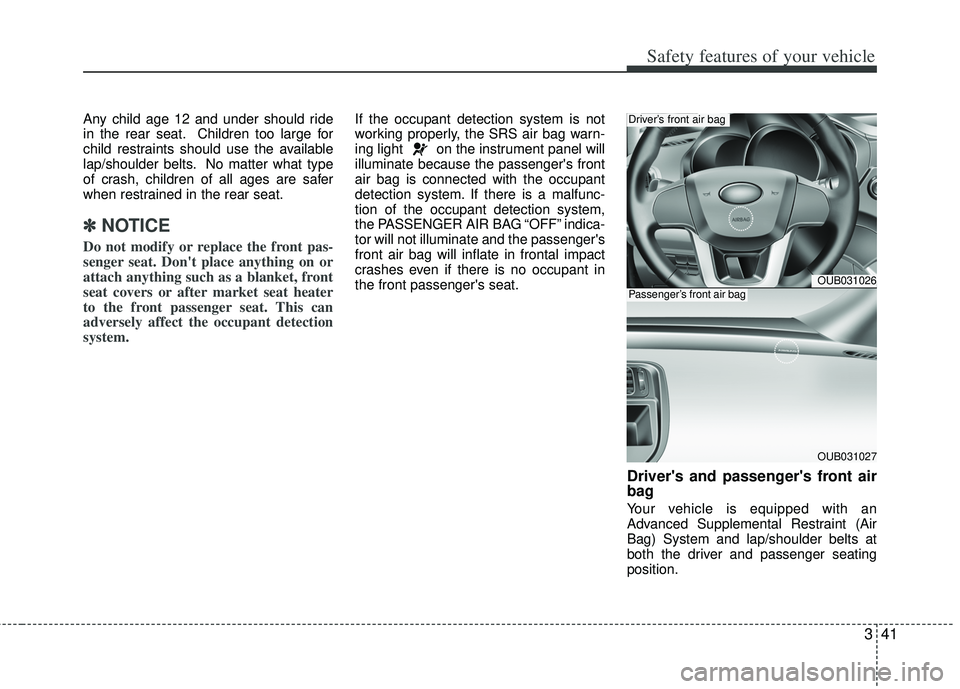
341
Safety features of your vehicle
Any child age 12 and under should ride
in the rear seat. Children too large for
child restraints should use the available
lap/shoulder belts. No matter what type
of crash, children of all ages are safer
when restrained in the rear seat.
✽ ✽NOTICE
Do not modify or replace the front pas-
senger seat. Don't place anything on or
attach anything such as a blanket, front
seat covers or after market seat heater
to the front passenger seat. This can
adversely affect the occupant detection
system.
If the occupant detection system is not
working properly, the SRS air bag warn-
ing light on the instrument panel will
illuminate because the passenger's front
air bag is connected with the occupant
detection system. If there is a malfunc-
tion of the occupant detection system,
the PASSENGER AIR BAG “OFF” indica-
tor will not illuminate and the passenger's
front air bag will inflate in frontal impact
crashes even if there is no occupant in
the front passenger's seat.
Driver's and passenger's front air
bag
Your vehicle is equipped with an
Advanced Supplemental Restraint (Air
Bag) System and lap/shoulder belts at
both the driver and passenger seating
position.
OUB031026
OUB031027
Driver’s front air bag
Passenger’s front air bag
Page 64 of 385
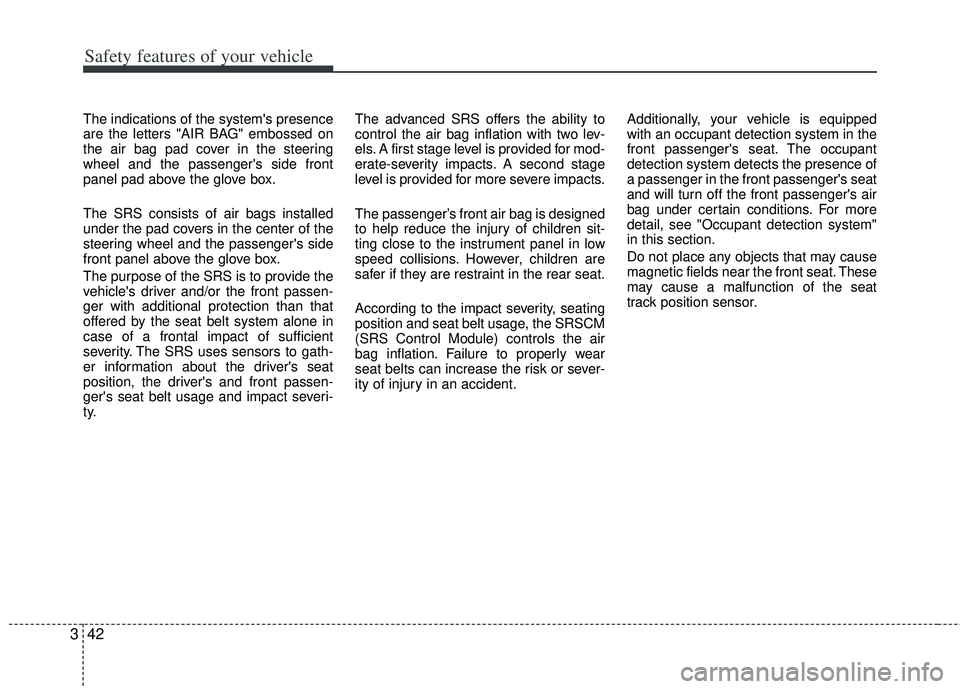
Safety features of your vehicle
42
3
The indications of the system's presence
are the letters "AIR BAG" embossed on
the air bag pad cover in the steering
wheel and the passenger's side front
panel pad above the glove box.
The SRS consists of air bags installed
under the pad covers in the center of the
steering wheel and the passenger's side
front panel above the glove box.
The purpose of the SRS is to provide the
vehicle's driver and/or the front passen-
ger with additional protection than that
offered by the seat belt system alone in
case of a frontal impact of sufficient
severity. The SRS uses sensors to gath-
er information about the driver's seat
position, the driver's and front passen-
ger's seat belt usage and impact severi-
ty. The advanced SRS offers the ability to
control the air bag inflation with two lev-
els. A first stage level is provided for mod-
erate-severity impacts. A second stage
level is provided for more severe impacts.
The passenger’s front air bag is designed
to help reduce the injury of children sit-
ting close to the instrument panel in low
speed collisions. However, children are
safer if they are restraint in the rear seat.
According to the impact severity, seating
position and seat belt usage, the SRSCM
(SRS Control Module) controls the air
bag inflation. Failure to properly wear
seat belts can increase the risk or sever-
ity of injury in an accident.
Additionally, your vehicle is equipped
with an occupant detection system in the
front passenger's seat. The occupant
detection system detects the presence of
a passenger in the front passenger's seat
and will turn off the front passenger's air
bag under certain conditions. For more
detail, see "Occupant detection system"
in this section.
Do not place any objects that may cause
magnetic fields near the front seat. These
may cause a malfunction of the seat
track position sensor.
Page 65 of 385
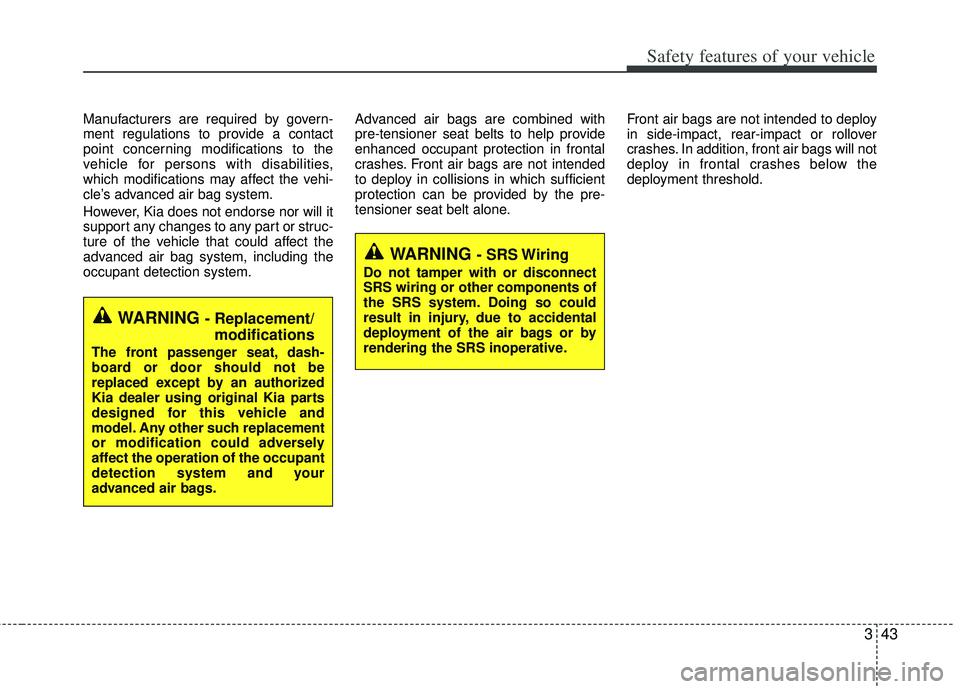
343
Safety features of your vehicle
Manufacturers are required by govern-
ment regulations to provide a contact
point concerning modifications to the
vehicle for persons with disabilities,
which modifications may affect the vehi-
cle’s advanced air bag system.
However, Kia does not endorse nor will it
support any changes to any part or struc-
ture of the vehicle that could affect the
advanced air bag system, including the
occupant detection system.Advanced air bags are combined with
pre-tensioner seat belts to help provide
enhanced occupant protection in frontal
crashes. Front air bags are not intended
to deploy in collisions in which sufficient
protection can be provided by the pre-
tensioner seat belt alone.
Front air bags are not intended to deploy
in side-impact, rear-impact or rollover
crashes. In addition, front air bags will not
deploy in frontal crashes below the
deployment threshold.
WARNING - Replacement/
modifications
The front passenger seat, dash-
board or door should not be
replaced except by an authorized
Kia dealer using original Kia parts
designed for this vehicle and
model. Any other such replacement
or modification could adversely
affect the operation of the occupant
detection system and your
advanced air bags.
WARNING - SRS Wiring
Do not tamper with or disconnect
SRS wiring or other components of
the SRS system. Doing so could
result in injury, due to accidental
deployment of the air bags or by
rendering the SRS inoperative.
Page 66 of 385

Safety features of your vehicle
44
3
❈ The actual air bags in the vehicle may differ
from the illustration.
Side impact air bag
Your vehicle is equipped with a side
impact air bag in each front seat. The purpose of the air bag is to provide
the vehicle's driver and/or the front pas-
senger with additional protection than
that offered by the seat belt alone.
The side impact air bags are designed to
deploy only during certain side-impact
collisions, depending on the crash sever-
ity, angle, speed and point of impact. The
side air bags are not designed to deploy
in all side impact situations.
OUB031030
OLM032310L
Front
OUB031044N
OUB031045N
OUB031046N
Side impact
Rear impact
Rollover
WARNING - Unexpected deployment
Avoid impact to the side impact
airbag sensor when the ignition
switch is ON to prevent unexpected
deployment of the side impact air
bag.
Page 67 of 385
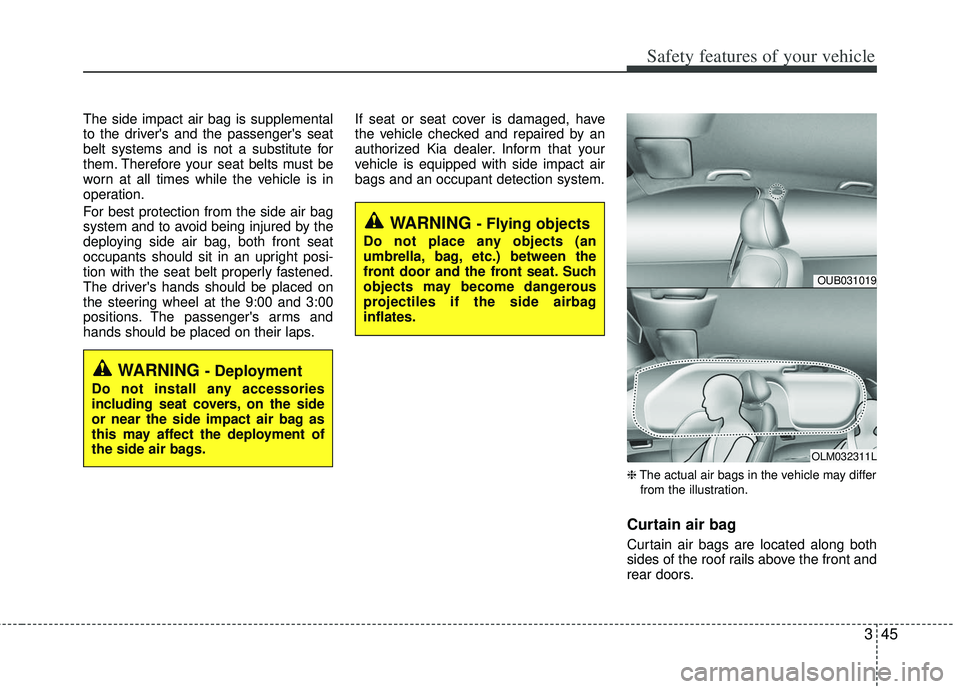
345
Safety features of your vehicle
The side impact air bag is supplemental
to the driver's and the passenger's seat
belt systems and is not a substitute for
them. Therefore your seat belts must be
worn at all times while the vehicle is in
operation.
For best protection from the side air bag
system and to avoid being injured by the
deploying side air bag, both front seat
occupants should sit in an upright posi-
tion with the seat belt properly fastened.
The driver's hands should be placed on
the steering wheel at the 9:00 and 3:00
positions. The passenger's arms and
hands should be placed on their laps.If seat or seat cover is damaged, have
the vehicle checked and repaired by an
authorized Kia dealer. Inform that your
vehicle is equipped with side impact air
bags and an occupant detection system.
❈
The actual air bags in the vehicle may differ
from the illustration.
Curtain air bag
Curtain air bags are located along both
sides of the roof rails above the front and
rear doors.
WARNING - Deployment
Do not install any accessories
including seat covers, on the side
or near the side impact air bag as
this may affect the deployment of
the side air bags.
WARNING - Flying objects
Do not place any objects (an
umbrella, bag, etc.) between the
front door and the front seat. Such
objects may become dangerous
projectiles if the side airbag
inflates.
OUB031019
OLM032311L
Page 68 of 385
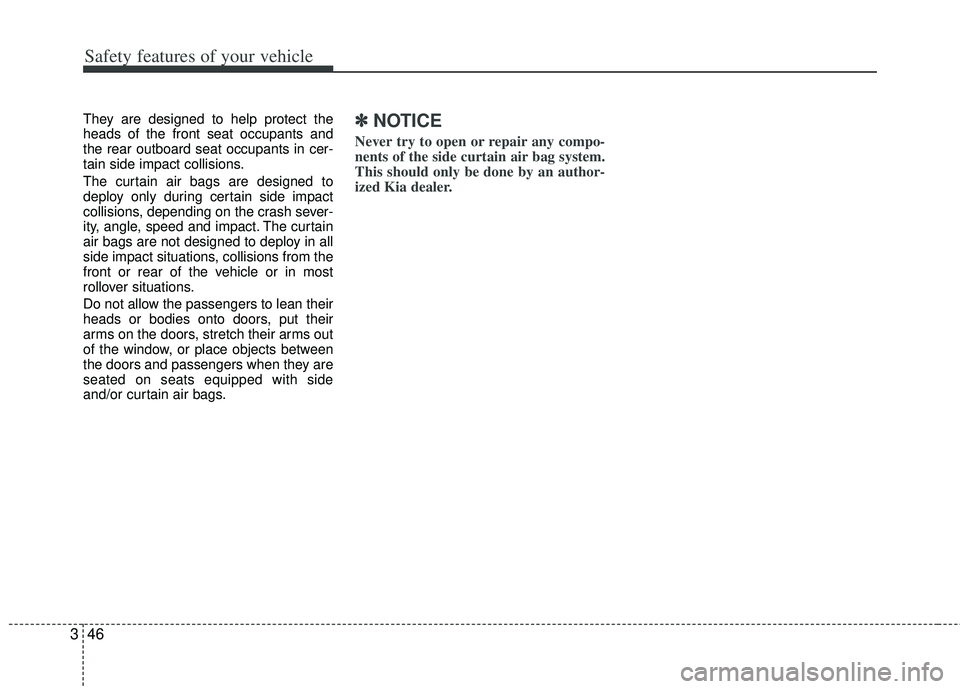
Safety features of your vehicle
46
3
They are designed to help protect the
heads of the front seat occupants and
the rear outboard seat occupants in cer-
tain side impact collisions.
The curtain air bags are designed to
deploy only during certain side impact
collisions, depending on the crash sever-
ity, angle, speed and impact. The curtain
air bags are not designed to deploy in all
side impact situations, collisions from the
front or rear of the vehicle or in most
rollover situations.
Do not allow the passengers to lean their
heads or bodies onto doors, put their
arms on the doors, stretch their arms out
of the window, or place objects between
the doors and passengers when they are
seated on seats equipped with side
and/or curtain air bags.✽ ✽
NOTICE
Never try to open or repair any compo-
nents of the side curtain air bag system.
This should only be done by an author-
ized Kia dealer.
Page 69 of 385

347
Safety features of your vehicle
Why didn’t my air bag go off in a
collision? (Inflation and non-infla-
tion conditions of the air bag)
There are many types of accidents in
which the air bag would not be expect-
ed to provide additional protection.
These include rear impacts, second or
third collisions in multiple impact
accidents, as well as low speed
impacts. In other words, just because
your vehicle is damaged and even if it
is totally unusable, don’t be surprised
that the air bags did not inflate.
Air bag collision sensors
(1) SRS control module
(2) Front impact sensor(3) Side impact sensor
1233
OUB031031N/OUB031032/OUB031040N/OUB031033/OUB031047N
Page 70 of 385

Safety features of your vehicle
48
3
Problems may arise if the sensor instal-
lation angles are changed due to the
deformation of the front bumper, body or
B pillar where side collision sensors are
installed. Have the vehicle checked and
repaired by an authorized Kia dealer.
Installing aftermarket bumper guards or
replacing a bumper with non-genuine
parts may adversely affect your vehicle’s
collision and air bag deployment per-
formance.
Air bag inflation conditions
Front air bags
Front air bags are designed to inflate in a
frontal collision depending on the intensi-
ty, speed or angles of impact of the front
collision.
WARNING - Air bag
sensors
Do not hit or allow any objects to
impact the locations where air
bag or sensors are installed.
This may cause unexpected air
bag deployment, which could
result in serious personal injury
or death.
If the installation location or angle of the sensors is altered in
any way, the air bags may deploy
when they should not or they may
not deploy when they should.
Therefore, do not try to perform
maintenance on or around the air
bag sensors. Have the vehicle
checked and repaired by an
authorized Kia dealer.
1VQA2084